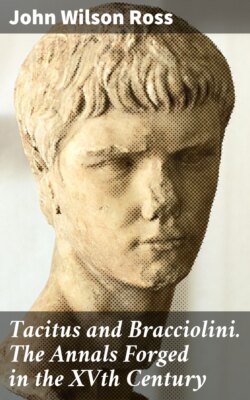Читать книгу Tacitus and Bracciolini. The Annals Forged in the XVth Century - John Wilson Ross - Страница 3
На сайте Литреса книга снята с продажи.
PREFACE
ОглавлениеTable of Contents
The theory broached in this book involves a charge of the grossest fraud against a most distinguished man, who rose to high posts in public affairs and won imperishable fame in letters. There being blots on his moral character, it would be censurable to fasten upon his memory this new imputation of dishonesty, were it not substantiated by irresistible evidence.
The title of this book quite explains what its design is—to contribute something towards settling the authorship of the Annals of Tacitus, which encomiastic admirers imagine to be the most extraordinary history ever penned, and the writer "but one degree removed from inspiration, if not inspired." This wondrous writer I assert to be the famous Florentine of the Renaissance, Poggio Bracciolini, in favour of which view I have tried to make out a case by bringing forward a variety of passages from the "History" and the "Annals" to show an extensive series of contradictions as to facts and characters, departures from truth about matters connected with ancient Roman life, laches in grammar and use of words that never could have proceeded from any patrician or plebian of the world-renowned old Commonwealth, with a number of other things that will readily strike the intelligent and sober mind as utterly inconsistent with the existing belief of the "Annals" being the production of Tacitus. All this is case in the shade for the fullest light to be thrown on the subject, when not wishing to make my theory a matter of speculation but founded in common sense, I give a detailed history of the forgery, from its conception to its completion, the sum that was paid for it, the abbey where it was transcribed, and other such convincing minutiae taken from a correspondence that Poggio carried on with a familiar friend who resided in Florence.
A reader of acumen and critical faculty following a writer in an inquiry of this nature places himself in the position of a lawyer who will not accept the interpretation of an Act of Parliament, or even a clause in it, as correct, except—as his phrase goes—it "runs upon all fours:" he knows that it is with a speculation in a literary matter as with a chapter of a statute: he struggles to raise only a single valid objection against what is advanced: if successful he at one destroys the whole of the theory, from thus exposing it to view as not "running upon all fours;" the fabric is, in fact, discovered to be reared on a false foundation; it must, therefore, fall as at the slightest breath a child's house built of cards; and the theory becomes one more added to the list of those that are apocryphal. If on examination it should be agreed that the theory in this book is without a flaw, I conceived that I shall have done not a small, but a considerable service to the cause of true history.
LONDON, April 3, 1878.
